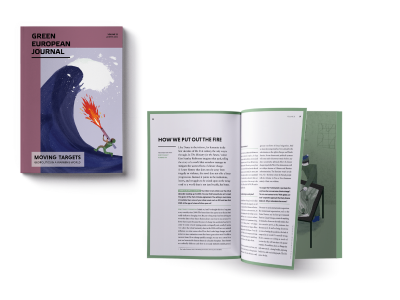As part of this edition’s “Rising Tides, Rising Tensions” series on the front lines of the ecological crisis around the world, we hear from writers about the geopolitics of climate change in Brazil, Morocco, Nigeria, Serbia, and Turkey. In this piece, Sevil Turan speaks to us about devastating forest fires in Turkey, the government reaction and its implications for future.
The summer of 2021 witnessed one of the biggest disasters Turkey had ever seen. In total, approximately 178,000 hectares of forest were reduced to ash. According to the European Forest Fire Information System, this area is approximately 755 times the average size of the areas that had burned in Turkey over the previous 12 years. Elsewhere, over 100 people lost their lives in disastrous floods that hit the country’s north.
When these devastating climate impacts hit, the Turkish government was busy acquiring rights over fossil fuels in the Eastern Mediterranean through its exclusive economic zone, as well as consolidating ties with Russia, already close thanks to the natural gas trade, by accelerating the construction of the Akkuyu nuclear plant.

Ecological damage and the erosion of a culture that allowed for social dialogue and coexistence are among the most destructive effects of the regime of Recep Tayyip Erdoğan, who has been in power for almost 20 years. During this period, domestic opposition to ecologically damaging policies has been seen as an external (foreign) enemy, a form of action endangering the integrity and safety of the state. This narrative of course overlooks the fact that a substantial number of these projects are backed by foreign investment. This anti-democratic environment has polarised issues such as sustainability, coexistence, and the commons, as well as basic rights and freedoms.
The fact that calls to request international assistance from members of the Turkish public in the midst of the fires were met with a negative response from the government speaks to how division permeates all discussions. The fires are presented as a security problem with no connection to the climate crisis; for the government to implement preventive policies would be to admit otherwise. A large part of society stands behind the claim that these fires, which lasted two weeks, were started by the Kurdistan Workers’ Party (PKK).
In this context, it would be insufficient to see Turkey’s active expansion of natural gas extraction in the Eastern Mediterranean solely as conflicting with the commitments it made when ratifying the Paris Agreement with the promise to reach net-zero emissions in 2053.
The fact that the European Union considers natural gas a transition fuel and prioritises the security of its members over global action in the fight against the climate crisis is undermining regional peace in the Eastern Mediterranean.
Turkey’s energy policies are closely linked to its broader objectives: securing Northern Cyprus as a region under its auspices, maintaining regional power status through patronage relationships, and, in turn, strengthening the regime’s legitimacy and support within Turkey with power drawn from its actions abroad.
The various actors, including Turkey and the EU, vying for a share of the region’s natural resources are not only casting a shadow over the hopes of the island’s people for peace and a common future; they are also creating a new fossil fuel sector that will lock in future carbon emissions. In the age of the climate crisis, this represents a failure to learn from the wars fought for years in the region over the control of fossil fuels.
The fact that the European Union considers natural gas a transition fuel and prioritises the security of its members over global action in the fight against the climate crisis is undermining regional peace in the Eastern Mediterranean. Considering the humanitarian crisis that followed the Syrian war, the EU should avoid making room for new fossil energy sources that endanger its neighbours’ freedom and security. Ignoring the problems that democracy faces in the region or going it alone against the climate crisis are out of the question.

